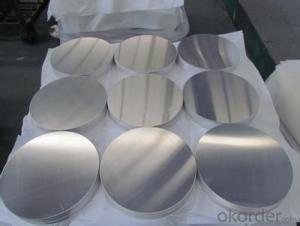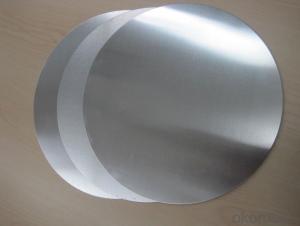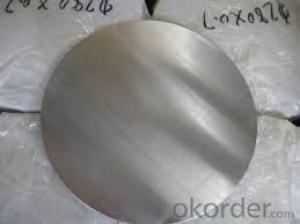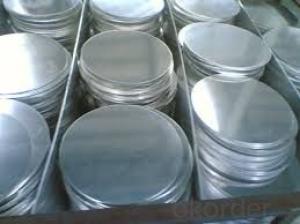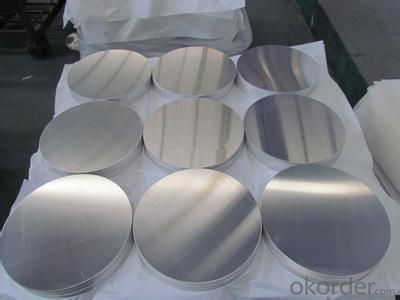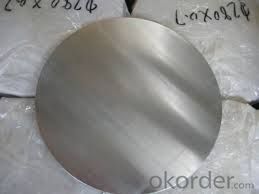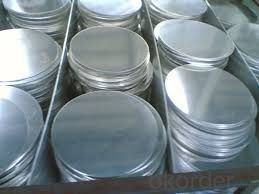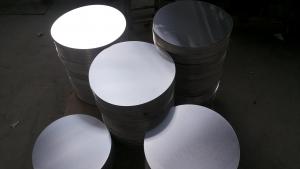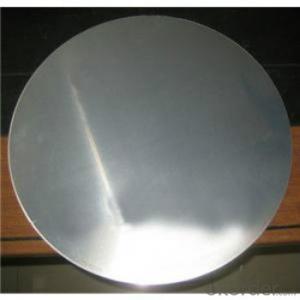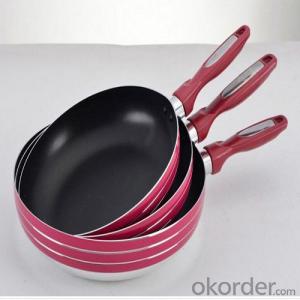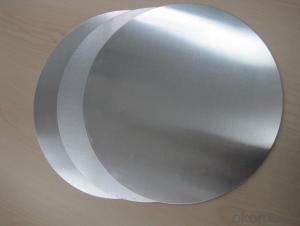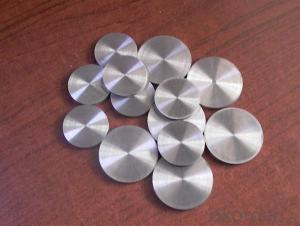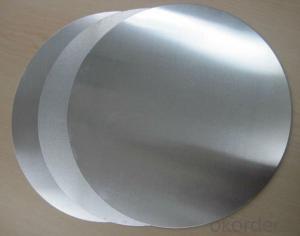Aluminum Circle Panel for Cookware Circles
- Loading Port:
- China main port
- Payment Terms:
- TT OR LC
- Min Order Qty:
- 5 m.t.
- Supply Capability:
- 360 m.t./month
OKorder Service Pledge
OKorder Financial Service
You Might Also Like
Specification
Aluminum Circle Panel for Cookware Circles
Hot rolled aluminum circle deep drawing quality for cookware is mainly used for general commercial and industrial uses, like the capacitor case, toothpaste case, medical tubes, kitchen ware, spray bottle, cosmetic case. With high quality casting and rolling coils or hot-rolled coils as raw meterials, it goes through different cold rolling deformation, slitting, annealing and finally stamping into an aluminum disc, then packaging for delivery.
l Specification
Certificate | ISO9001:2008 ISO 14001:2004 OHSAS 18001:2007 | |||||||||||
Product Name | 1050 Aluminum circle price for cookware | |||||||||||
Hardness state | H14, H16, H18, H22,H24, H26, H22 ,H32,H34 and “O”. | |||||||||||
Product Size | Thickness: 0.3-68.0mm, Diameter: 20-1030mm | |||||||||||
Surface Treatment | mill finished | |||||||||||
Processed | Deep drawings | |||||||||||
Min order quantity | 5 tons | |||||||||||
Short lead time | 20 days | |||||||||||
Application | Cookware, Electrical Appliances | |||||||||||
Month Capacity | 5000 tons | |||||||||||
Chemical Composition (WT.%) | ||||||||||||
Alloy | Min.AL | Si | Fe | Cu | Mn | Mg | Cr | Ni | Zn | Ca | ||
1050 | 99.5 | 0.25 | 0.4 | 0.05 | 0.05 | 0.05 | --- | --- | 0.05 | --- | ||
1060 | 99.6 | 0.25 | 0.35 | 0.05 | 0.03 | 0.03 | --- | --- | 0.05 | --- | ||
1070 | 99.7 | 0.25 | 0.25 | 0.04 | 0.03 | 0.03 | -- | --- | 0.04 | --- | ||
1100 | 99 | 0.95 | 0.95 | 0.05-0.2 | 0.05 | --- | -- | --- | 0.1 | --- | ||
Mechanical Properties | ||||||||||||
TEMPER | THICKNESS(mm) | TENSILE STRENGTH | ELONGATION% | |||||||||
HO | 0.55-5.50 | 60-100 | ≥ 20 | |||||||||
H12 | 0.55-5.50 | 70-120 | ≥ 4 | |||||||||
H14 | 0.55-5.50 | 85-120 | ≥ 2 | |||||||||
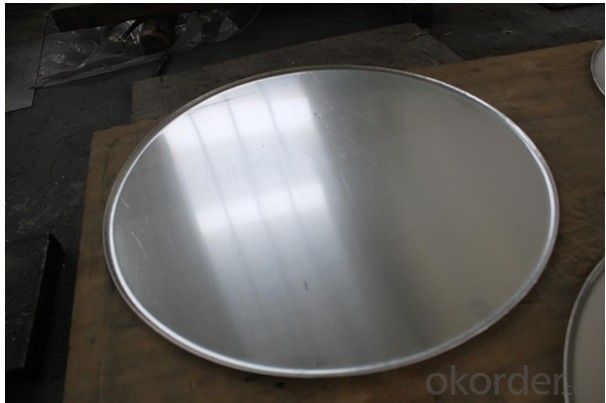
FAQ
1. How can I get some samples?
We are honored to offer you samples. New clients are expected to pay for the courier cost. The samples are free for you.
2 Do you have any certificates?
Our products passed inspection of SGS, FDA, and CE Quality is priority! Every worker keeps the QC from the very beginning to the very end, Quality control department especially responsible for quality checking in each process.
3 Can your factory print or emboss my logo on the goods?
Yes, we can print or emboss the logo on the goods or their packing box.
4 What information should I let you know if I want to get a quotation?
1) The specification of products (length x width x thickness);
2) The temper and alloy.
3) The final product you will use to be made
4 It will be better if you can show us the pictures or design sketch. Samples will be best for clarifying. If not, we will recommend relevant products with details for reference.We usually produce goods based on customers
Samples or based on customers’ picture, logo, sizes etc.
- Q: What is the typical impact strength of aluminum sheets?
- The typical impact strength of aluminum sheets can vary depending on the alloy and temper of the material. However, in general, aluminum sheets have a relatively low impact strength compared to other metals. This is because aluminum is a lightweight material that is not as strong or durable as steel or other alloys. The impact strength of aluminum sheets is typically measured in terms of the energy required to cause the material to fracture or deform. This can be expressed in units such as joules or foot-pounds. While specific values may vary, aluminum sheets generally have an impact strength ranging from 10 to 40 joules or 7 to 30 foot-pounds. It is important to note that the impact strength can be influenced by factors such as thickness, surface condition, and the presence of any surface treatments or coatings. Therefore, it is recommended to consult the manufacturer's specifications or conduct specific tests to determine the impact strength of a particular aluminum sheet.
- Q: This question asks about the impact of aluminum sheets on the quality of air inside a building.
- <p>Aluminum sheets themselves do not directly affect indoor air quality in a building. They are inert materials that do not emit harmful gases or particles. However, the installation process may involve adhesives or sealants that could release volatile organic compounds (VOCs) temporarily, which can affect air quality. Proper ventilation during installation and after can mitigate this. Additionally, aluminum sheets can contribute to better air quality by providing a barrier against moisture and mold growth, which can be a concern with other building materials.</p>
- Q: What is the modulus of elasticity for aluminum sheets?
- The modulus of elasticity for aluminum sheets typically ranges between 69 GPa and 73 GPa.
- Q: Are aluminum sheets suitable for insulation cladding?
- Aluminum sheets are a suitable option for insulation cladding. This material is highly versatile and durable, commonly used in construction for multiple purposes, including insulation cladding. The thermal properties of aluminum sheets are excellent, effectively preventing heat transfer. Additionally, their low thermal conductivity ensures improved energy efficiency by minimizing heat transfer between the building's interior and exterior. Moreover, aluminum is lightweight and easy to handle, making it convenient for installation purposes. It is also resistant to corrosion, allowing it to withstand various weather conditions and remain a long-lasting choice. Furthermore, aluminum sheets are available in different thicknesses, providing customization options based on specific insulation requirements. Not only do aluminum sheets possess functional benefits, but they also enhance the overall appearance of the building. With their sleek and modern look, these sheets can be easily painted or coated in different colors to match the desired aesthetic design. In conclusion, aluminum sheets are an excellent choice for insulation cladding due to their thermal properties, durability, ease of installation, and aesthetic appeal.
- Q: This question asks for methods to determine the reliability of a supplier for aluminum sheets.
- <p>To determine if your supplier is reliable for supplying aluminum sheets, consider the following: Check their track record and customer reviews for consistency and quality. Assess their industry certifications, such as ISO standards, which indicate commitment to quality management. Evaluate their supply chain transparency and their ability to meet delivery timelines. Look into their financial stability to ensure they can sustain operations. Request samples to test the quality of their aluminum sheets. Finally, communicate openly with them to gauge their responsiveness and professionalism.</p>
- Q: What are the different methods of cutting aluminum sheet?
- There are several methods of cutting aluminum sheet, each with its own advantages and applications. 1. Shearing: This is a straightforward method that involves using a sharp blade to cut through the aluminum sheet. It is a fast and efficient process, especially for straight cuts. However, it may not be suitable for complex or intricate designs. 2. Laser cutting: Laser cutting utilizes a high-powered laser beam to melt or vaporize the aluminum sheet, resulting in a precise and clean cut. This method is ideal for intricate designs, as it allows for detailed and accurate cuts. Laser cutting is also fast and can be automated, making it suitable for large-scale production. 3. Waterjet cutting: Waterjet cutting involves using a high-pressure stream of water mixed with abrasive materials to cut through the aluminum sheet. This method is versatile and can handle different materials and thicknesses. It produces a smooth and precise cut without generating heat, making it suitable for heat-sensitive materials. 4. Plasma cutting: Plasma cutting involves using a plasma torch to heat and melt the aluminum sheet, creating a cut. It is a fast and cost-effective method, especially for thicker sheets. However, the cut might not be as clean compared to laser or waterjet cutting. 5. CNC milling: Computer Numerical Control (CNC) milling involves using a rotating cutting tool to remove material from the aluminum sheet, creating a cut. This method is precise and can produce complex shapes and designs. It is commonly used for prototypes or small production runs. It is important to consider factors such as the desired cut quality, complexity of the design, material thickness, and production volume when choosing the appropriate method for cutting aluminum sheet.
- Q: Can aluminum sheets be etched or engraved?
- Yes, aluminum sheets can be etched or engraved. Etching or engraving on aluminum sheets is a process that involves removing some of the material from the surface using acid or a high-powered laser. This can be done to create intricate designs, patterns, or even text on the aluminum sheet. The etching or engraving process can be used for various applications, such as signage, decorative pieces, or industrial parts. The resulting etched or engraved design on the aluminum sheet can be further enhanced by adding color or other finishes to create a desired look.
- Q: Can aluminum sheet be used for reflective surfaces?
- Indeed, reflective surfaces can be achieved with the use of aluminum sheet. Renowned for its exceptional reflectivity, aluminum is widely preferred for an array of applications that call for reflective surfaces. By skillfully polishing aluminum sheets, they can attain a remarkable luster, enabling them to reflect light and produce a mirror-like effect. Consequently, they prove to be the perfect choice for applications such as lighting fixture reflectors, solar panels, mirrors, and decorative purposes. Moreover, owing to its reflective properties, aluminum is an ideal material for situations necessitating heat reflection, including thermal insulation and roofing materials. In summary, aluminum sheets offer versatility and effectiveness when it comes to generating reflective surfaces.
- Q: I bought a house with aluminum wiring. Its about 1600 square feet. I have not had any problems with the electric but I read all these story's about how terrible aluminum wiring is.. is it worth the cost to replace? Most houses on my street have it also.. they have had no problems.. house was built in 79.How much would it cost to replace? would walls have to come down to do it?
- RE: My house has aluminum wiring? I bought a house with aluminum wiring. Its about 1600 square feet. I have not had any problems with the electric but I read all these story's about how terrible aluminum wiring is.. is it worth the cost to replace? Most houses on my street have it also.. they have had no problems.. house was...
- Q: How do I calculate the weight of aluminum sheet? What is the density?
- Weight by volume * density. With the quality, volume density.
Send your message to us
Aluminum Circle Panel for Cookware Circles
- Loading Port:
- China main port
- Payment Terms:
- TT OR LC
- Min Order Qty:
- 5 m.t.
- Supply Capability:
- 360 m.t./month
OKorder Service Pledge
OKorder Financial Service
Similar products
Hot products
Hot Searches
Related keywords
